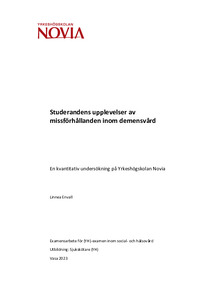Studerandens upplevelser av missförhållanden inom demensvård: en kvantitativ undersökning på Yrkeshögskolan Novia
Envall, Linnea (2023)
Envall, Linnea
2023
All rights reserved. This publication is copyrighted. You may download, display and print it for Your own personal use. Commercial use is prohibited.
Julkaisun pysyvä osoite on
https://urn.fi/URN:NBN:fi:amk-202305109164
https://urn.fi/URN:NBN:fi:amk-202305109164
Tiivistelmä
Demens är en av Finlands folksjukdomar som ökar i takt med landets åldrande befolkning. På samma gång finns det en landsomfattande brist på vårdare i landet. Bristen påverkar speciellt äldreomsorgen och skapar konsekvenser för vårdtagarna i form av hårdhänthet och dåligt bemötande från vårdarnas sida. Dessa s.k. missförhållanden antar skribenten att påverkar studeranden på ett eller annat sätt.
Syftet med examensarbetet var att undersöka studerandens upplevelser och frekvens av missförhållanden inom demensvården. Undersökningen har genomförts på Yrkeshögskolan Novias vårdstuderanden genom en webbenkät 23.2-9.3.2023. Enkäten bestod av både öppna och slutna frågor som handlade om arbetsplatskulturen, förekomst av missförhållanden och upplevelsernas påverkan på viljan att studera. Resultatet analyserades med kvalitativ innehållsanalys och kvantitativa svar visualiserades med diagram.
Det kom fram i resultat att majoriteten, 62% av enkätens respondenter, har sett missförhållanden inom demensvård på praktik eller på sitt arbete. Frekvensen av missförhållanden uppgavs av majoriteten att ha skett 1–2 gånger per dag. Upplevelserna av missförhållanden påverkade studerandens vilja att fortsätta studera både positivt och negativt. Dementia is one of Finland's national diseases, which is increasing in line with the country's aging population. At the same time, there is a nationwide shortage of caregivers in the country. The shortage affects care for the elderly and creates consequences for patients in the form of harshness and poor treatment. The writer assumes that these so-called malpractice affects the student in one way or another.
The purpose of the degree project was to investigate the student's experiences and frequency of malpractice in dementia care. The survey has been carried amongst nursing students at Novia University of Applied Sciences through a web survey 23.2-9.3.2023. The survey consisted of both open and closed questions that investigated the workplace culture, occurrence of misconduct and the impact of the experiences on the desire to study. The results were analyzed with qualitative content analysis and quantitative results were visualized with diagrams.
It emerged from the results that the majority, 62% of the survey respondents, have seen malpractices in dementia care in practice or at work. The frequency of malpractice was stated by the majority to have occurred 1–2 times per day. The experiences of misconduct affected the student's willingness to continue studying both positively and negatively.
Syftet med examensarbetet var att undersöka studerandens upplevelser och frekvens av missförhållanden inom demensvården. Undersökningen har genomförts på Yrkeshögskolan Novias vårdstuderanden genom en webbenkät 23.2-9.3.2023. Enkäten bestod av både öppna och slutna frågor som handlade om arbetsplatskulturen, förekomst av missförhållanden och upplevelsernas påverkan på viljan att studera. Resultatet analyserades med kvalitativ innehållsanalys och kvantitativa svar visualiserades med diagram.
Det kom fram i resultat att majoriteten, 62% av enkätens respondenter, har sett missförhållanden inom demensvård på praktik eller på sitt arbete. Frekvensen av missförhållanden uppgavs av majoriteten att ha skett 1–2 gånger per dag. Upplevelserna av missförhållanden påverkade studerandens vilja att fortsätta studera både positivt och negativt.
The purpose of the degree project was to investigate the student's experiences and frequency of malpractice in dementia care. The survey has been carried amongst nursing students at Novia University of Applied Sciences through a web survey 23.2-9.3.2023. The survey consisted of both open and closed questions that investigated the workplace culture, occurrence of misconduct and the impact of the experiences on the desire to study. The results were analyzed with qualitative content analysis and quantitative results were visualized with diagrams.
It emerged from the results that the majority, 62% of the survey respondents, have seen malpractices in dementia care in practice or at work. The frequency of malpractice was stated by the majority to have occurred 1–2 times per day. The experiences of misconduct affected the student's willingness to continue studying both positively and negatively.
